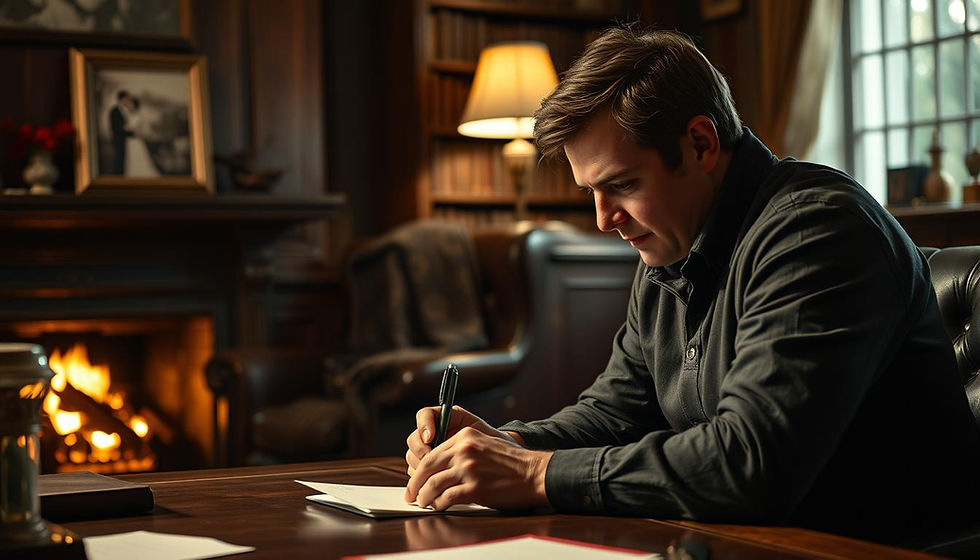The Surprising History of Valentine's Day and Guilt for Men
- LADY JANICE

- Feb 13, 2025
- 8 min read
Have you ever felt a sense of guilt on Valentine's Day? As I look into the Valentine's Day history, it's clear that love has turned into a complex event. It's filled with expectations and pressure. The story of Valentines where did it originate shows how traditions have changed, often making men feel left out or under pressure.
Let's dive into how Valentine's Day has grown and the emotional weight it puts on men.

Key Takeaways - The Surprising History of Valentine's Day and Guilt for Men
Valentine's Day has a rich and varied history that influences its modern perception.
Understanding the origins of Valentine's Day provides insight into its current customs.
Men often feel societal pressure to perform on Valentine's Day, leading to feelings of guilt.
The evolution from pagan traditions to Christian context marked a significant shift in the holiday.
By recognizing the origins of Valentine's Day guilt, men can better navigate their expectations.
Addressing the unspoken pressures of Valentine's Day is crucial for a healthier approach to love.
Introduction to Valentine's Day
Reflecting on Valentine's Day, I find it fascinating how it has become a part of American culture. It started as a day for love and affection. Now, it's a time to celebrate romance widely. The history and emotions behind it continue to grow.
The holiday has changed over time. It's now filled with greeting cards and expensive gifts. This makes me feel like I must do more to show love. Many feel the valentine's day guilt trip pressure to prove their love.
Despite the pressure, I love the idea of celebrating love. It's important to see beyond the commercial side. Knowing the holiday's history helps us enjoy it for what it truly is: a chance to connect with those we love.
The Origins of Valentine's Day
The story of Valentine's Day is filled with traditions and legends. These stories show its deep roots in romance. To grasp the holiday's true meaning, we must look back to ancient times. The origins of Valentine's Day offer a glimpse into how today's celebrations began.
Early Traditions and Legends
In ancient Rome, Valentine's Day festivities started. The Lupercalia festival, celebrated in mid-February, was all about love and fertility. It paired young couples through rituals. These customs blended with the new celebration of love, creating today's Valentine's Day.
Key Historical Figures Associated with Valentine's Day
One key figure is Saint Valentine, a priest who secretly married couples in love. This was against the emperor's rules. His bravery shows the deep bond between love and sacrifice. Exploring Valentine's Day origins, we see how these stories shape our view of love's journey.

Valentines Where Did It Originate to Make Men Feel Guilty
Valentine's Day has become a day of deep feelings, especially for men. They often feel trapped by what society expects of them. This day, once filled with joy, now often leads to feelings of guilt.
Societal norms dictate how love should be shown, even down to the gifts we give. These expectations can be crushing. It's like there's a heavy burden on men to meet these standards.
The celebration was once about love and connection. But today, it brings feelings of guilt. Men feel anxious and guilty if they don't live up to society's expectations. This guilt trip on Valentine's Day comes from old traditions and today's pressures.
It's clear that society makes men feel like their worth is tied to this day. They feel like they must perform to show love. This is a heavy burden to carry.

How Valentine's Day Evolved Over Time
Exploring the valentine's day history shows how this celebration has changed a lot over the years. It started with ancient pagan traditions and then became a Christian holiday. This change not only altered the holiday's purpose but also how we view love and commitment today.
The Shift from Pagan Traditions to Christian Context
In ancient times, love was celebrated with rituals that honored life and fertility. Many ask, valentines where did it originate? The answer lies in Roman and Celtic traditions, which linked love to nature. As Christianity spread, these traditions merged with Christian beliefs, turning the festival into a day for Saint Valentine, a symbol of love.
This mix of beliefs has shaped our modern celebrations of love. It has added depth but also brought societal expectations. Today, Valentine's Day is a time for personal and public expressions of love, often with pressure on men to be good partners.

Valentine's Day Guilt Trip: What Is It?
The idea of a valentine's day guilt trip for men is big in our world. It makes me think about how this day can be tough, thanks to society's rules on love. These rules can make a man feel like he's not doing enough.
Men might feel like they need to do too much, like giving big gifts or acting like movie heroes. When they don't meet these high standards, they can feel like they're not good enough. It's interesting to see how many men feel this valentine's day guilt when they compare themselves to others.

Many men get anxious on Valentine's Day. This shows that the idea of love has become more like a duty than a true feeling. Knowing this can help us enjoy Valentine's Day more, without feeling guilty.
Modern-Day Expectations of Valentine's Day
Valentine's Day has changed a lot. It now feels like a big deal, especially for men. They might feel like they need to do a lot to show love.
The idea of love gets mixed up with buying gifts and making big plans. This makes people feel like they're not doing enough if they don't meet these expectations. It's like they're being told they're not good enough if they don't spend a lot or plan something big.
Pressure on Men to Perform
Men often feel really bad about this. They might think their efforts aren't enough. This makes Valentine's Day feel more like a burden than a celebration.
Everyone expects big, expensive gifts and grand gestures. This makes people focus more on showing off than on being genuine. It's all about the show, not the real feelings.
Consumerism and Valentine's Day
The holiday has become very commercial. Stores make a lot of money off of Valentine's Day. They push the idea that spending a lot shows love.
This mix of consumerism and Valentine's Day changes the holiday's true meaning. It makes people feel guilty and like they're overcommitting. It's all about the money, not the love.

The Psychological Aspects of Guilt Around Valentine's Day
Feeling guilty on Valentine's Day often comes from a mix of what society expects and our own experiences. Many men feel valentine's day guilt because of the high romantic standards they're expected to meet. The idea that this day needs big gestures can make us feel like we're not good enough.
Our personal stories also play a big part. Looking back at past Valentine's Days, we might remember times that didn't go as hoped. This can leave us with doubts and valentine's day guilt. The way love is shown in media today adds to the pressure, making it harder to feel okay.
Studies show that worrying about disappointing our partner can make us anxious and guilty. Knowing we're not alone in these feelings can help. It's important to see how our feelings are influenced by our experiences, society, and media.

Coping with Valentine's Day Guilt for Men
Valentine's Day can make us feel guilty, especially because of what society expects. To deal with this guilt, men can use certain strategies. These help manage the pressure of the holiday. By talking openly and staying true to ourselves, we can enjoy the day without stress.
Strategies to Manage Expectations
One good way to handle Valentine's Day guilt is to set realistic goals. I talk openly with my partner about what we both want for the day. This way, we meet each other's expectations, easing the holiday's pressure. It's important to remember that love is for every day, not just February 14.
Breaking Free from Societal Pressure
Another helpful strategy is to question the stories we hear about Valentine's Day. I focus on real connections, not just material gifts. It's key to know that love and appreciation don't need to be shown with big presents. Small gestures and spending time together can strengthen our bond, helping me avoid guilt and enjoy the day.

Valentine's Day Guilt: The Unspoken Conversation
Valentine's Day guilt is often kept quiet. It's time to talk about it. Many men feel a lot of pressure to meet high expectations. This can make them feel not good enough, leading to hidden conversations.
Every year, I see that many people struggle with Valentine's Day. Both men and women face the pressure of societal norms. By sharing our feelings of guilt and anxiety, we can understand each other better.
When we talk openly about Valentine's Day guilt, we can strengthen our relationships. We can grow closer through empathy and support. Let's not be afraid to have this important conversation. Together, we can make Valentine's Day a celebration of love, not guilt.

Looking Ahead: Changing the Narrative Around Valentine's Day
I think we can make Valentine's Day less about guilt by changing how we celebrate. Instead of focusing on big, expensive gestures, let's focus on personal connections. This way, we can make the holiday about real feelings, not just stuff.
Imagine celebrating love with small, meaningful acts. Like writing notes, sharing moments, or just being together. These actions build real connections and show the true value of our relationships. By doing this, we challenge the idea that love must be shown with expensive gifts.

This shift could lead to more open talks about love all year, not just on Valentine's Day. Together, we can make the holiday happier and less about guilt. By celebrating love in all its forms, we ensure everyone feels the joy it's meant to bring.
Conclusion
Looking back, Valentine's Day's history is more complex than I thought. It started with tradition but now is filled with consumerism and high expectations. It's important to see the guilt men often feel on this day.
Valentine's Day should be about real love and thanks, not just following old customs. It's a chance to show true feelings and appreciation. This way, we can make the day more meaningful.
Thinking about Valentine's Day, I see it as a chance to break free from old ideas. It's not just about history, but about making our connections stronger. It makes me want to celebrate love in a deeper, more sincere way.
I want everyone, especially men, to rethink Valentine's Day. Let's turn it into a day of real connection and celebration. My dream is for a positive change in how we view this holiday, making it a time for genuine connection and joy.
FAQ
What are the origins of Valentine's Day?
Valentine's Day started with ancient Roman festivals like Lupercalia, which honored fertility. It was named after Saint Valentine, a martyr who symbolized love and romance. This has shaped today's love and courtship customs.
Why do men often feel guilty on Valentine's Day?
Men feel guilty because of the pressure to give gifts and show love. They think not doing so makes them bad partners. This guilt comes from societal norms.
How has Valentine's Day evolved over time?
Valentine's Day has changed from a day for romantic love to a big commercial event. It combines old pagan traditions with Christian values. This mix adds pressure to follow consumer trends.
What is the Valentine's Day guilt trip?
The Valentine's Day guilt trip is the emotional weight men feel on this day. Expectations from society and personal feelings create a stressful situation. Anything less than grand gestures is seen as a failure.
How can men cope with Valentine's Day guilt?
Men can deal with guilt by talking openly with their partners and setting realistic goals. They should focus on personal connections over expensive gifts. Remember, true love is more important than what society expects.
Are there alternative ways to celebrate Valentine's Day?
Yes, there are other ways to celebrate. You can spend quality time together, make meaningful memories, or show love in non-material ways. Choosing personal connections over social norms makes the holiday more enjoyable.
How can we change the narrative around Valentine's Day?
We can change the narrative by talking openly about love without guilt or commercial pressure. Encouraging genuine expressions of affection helps build stronger relationships. This way, we can enjoy the holiday more.
What are some common myths about Valentine's Day?
Myths include thinking big gifts are essential or that love must be shown in certain ways. But love is unique to each relationship. What counts most is the thought and effort behind the gesture, not its price.
.png)



Comments